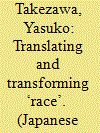| Srl | Item |
| 1 |
ID:
140343


|
|
|
|
|
| Summary/Abstract |
Although it is an almost established understanding in European and North American literature that race is a social construct, the general academic and social discourses surrounding race in Japan remain outside this model. This can be traced back to school textbooks and geography books in the early Meiji period, after these concepts and words were translated and introduced from Europe and the United States. This article will examine passages related to race in textbooks from the first half of the Meiji period, in order to explore the continuities and discontinuities in the state of knowledge production surrounding race and racial discrimination in contemporary Japan. Investigating the usage of words in educational practice allows us to see how ‘race’ was a term that was located in a position different from that of other words, and how the Japanese transformed their racial position in relation to others.
|
|
|
|
|
|
|
|
|
|
|
|
|
|
|
|
| 2 |
ID:
179906


|
|
|
|
|
| Summary/Abstract |
In the 1910s and 1920s, when Indonesian communists first seriously engaged with Marxism, they faced the questions of how to translate Marx's concepts from Dutch, the language in which they generally encountered them, into Malay, the lingua franca of the Indonesian archipelago, and how to make these ideas relevant in an Asian and largely Islamic context. Focusing on three aspects of Marxism—the ‘scientific’ nature of communism, class conflict in feudal and capitalist society, and the relationship between communism and Islam—I argue that Indonesian communists alternated between transliteration and translation in their exposition of Marxism. Transliterating ‘universal’ Marxist categories such as proletarian (proletar) and capitalism (kapitalisme) allowed Indonesian communists to speak in global terms and strengthened their claim that Marxism was a science with a universal terminology. At the same time, there was a process of ‘localization’, whereby foreign Marxist materials were translated to bring them closer to local cultural norms. Malay substitutes were found for Marx's typology of classes and historical eras, while Arabic terms associated with Islam were used to add a moral dimension to the Marxist critique of capitalism. These translations grounded Marxism in Islam and Indonesian history, but also elevated vernacular terms to universal status by eliding them with Marx's categories. The resulting style of Indonesian Marxism was multilingual. From the 1930s, however, Indonesian nationalists consciously moved away from transliteration, devising a more thoroughly Indonesian political vocabulary to replace Marx's terms, though one still clearly influenced by Marxism.
|
|
|
|
|
|
|
|
|
|
|
|
|
|
|
|